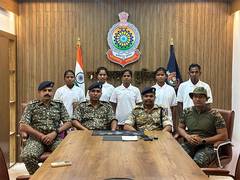“Our ships are actively involved…free from any terrorist activity”: DG of Indian Coast Guard
Devbhoomi Dwarka (Gujarat) [India], November 24 (ANI): Ahead of the 15th anniversary of the 26/11 Mumbai attacks, Indian Coast Guard Director-General Rakesh Pal said that the coastal security in territorial waters has been enhanced through patrolling and surveillance capabilities to prevent any terrorist activity in the country’s maritime domain.

In an exclusive interview with ANI, Pal said, “I can tell you with conviction that the Indian Coast Guard has nearly 55 to 60 ships for patrolling pan India. We have about 10-12 aircraft and helicopters that fly every day. So our response to any incidents is not more than 1 or 2 hours… On top of that, we maintain good synergy with the marine police… Our ships are actively involved in ensuring that our waters are free from any terrorist activity,” while speaking on the level of preparedness after the 26/11 attack.
Fifteen years ago, Pakistan carried out one of the most heinous terror attacks perpetrated anywhere in the world. The 26/11 Mumbai terror attack, was named after the date in 2008. The targets were carefully chosen after being surveyed for maximum impact, viz. the Taj and Oberoi Hotels, Chhatrapati Shivaji Maharaj Terminus, the Jewish centre at Nariman House, and the Leopold Cafe, since these places were frequented by Europeans, Indians and Jews.
“We man the Gulf of Katch 24X7 due to the sensitivity and proximity to the Pakistan coast… If there is any suspicious contact near the SPMs in the Gulf of Kutch and we apprehend anything suspicious…,” said Assistant Commandant Pranav Karpe.
Speaking about ICG expansion, the DG of the Indian Coast Guard said that the surface fleet is expected to grow.
“I want to tell you that as far as our ships and acquisition plans are considered, we have got about 157 surface ships and 78 aircraft… Shortly we are going to sign contracts for nine more advanced-sized helicopters…There are plans for acquiring long-range maritime surveillance aircraft, which the Air Force has taken, and the contracts will be signed with TASL (Tata Advanced Systems Limited), wherein we are about to get 6 C295… The Ministry of Defence is giving us adequate funds to ensure that our acquisition processes are all fast-tracked,” said Pal.
He also spoke on marine pollution and said that the ICG is expanding its fleet of pollution response vessels, with two more large vessels under construction and set to be delivered by 2025.
“I want to tell you that the Coast Guard has three pollution response vessels currently, and we are constructing two more big vessels… Those pollution response vessels will be delivered by 2025. In the end edition, we are also going for the procurement of pollution response equipment..,” said Pal.
Further, the Director General said that India imports about 80 per cent of its crude oil, with 70 per cent of it landing at Vadinar in the Gulf of Kutch. To address the potential environmental risks associated with this, the Coast Guard recently chaired the 25th National Oil Spill Disaster Contingency Plan (NOSDCP) annual feature.
“India imports about 80 per cent of its crude oil, and 70 per cent of the crude oil lands here at Vadinar, Gulf of Kutch… So we can imagine how many tonnes of crude oil are being imported to this place. So today in the morning, we chaired the 25th National Oil Spill Disaster Contingency Plan (NOSDCP) annual feature, where about 80 representatives from about 30-35 organisations, including the Ministry of Ports, Water, and Shipping… everybody attended this meeting. In this meeting, the challenges are discussed, which are related to the preparedness of all oil handling agencies, all other ports, and all other stakeholders who are involved in importing the oil. In this, we discussed the contingency plan for all the ports… This is a forum where many big issues are discussed so that we are well-prepared to counter and mitigate all the challenges,” Coast Guard DG said.
The Indian Coast Guard is a multi-mission organisation, conducting round-the-year real-life operations at sea. Despite being relatively small, it has a wide range of task capabilities for both surface and air operations, as per the Indian Coast Guard website.
The organisation is headed by the Director General Indian Coast Guard (DGICG) exercising his overall command and superintendence from the Coast Guard Headquarters (CGHQ) located in New Delhi. (ANI)






